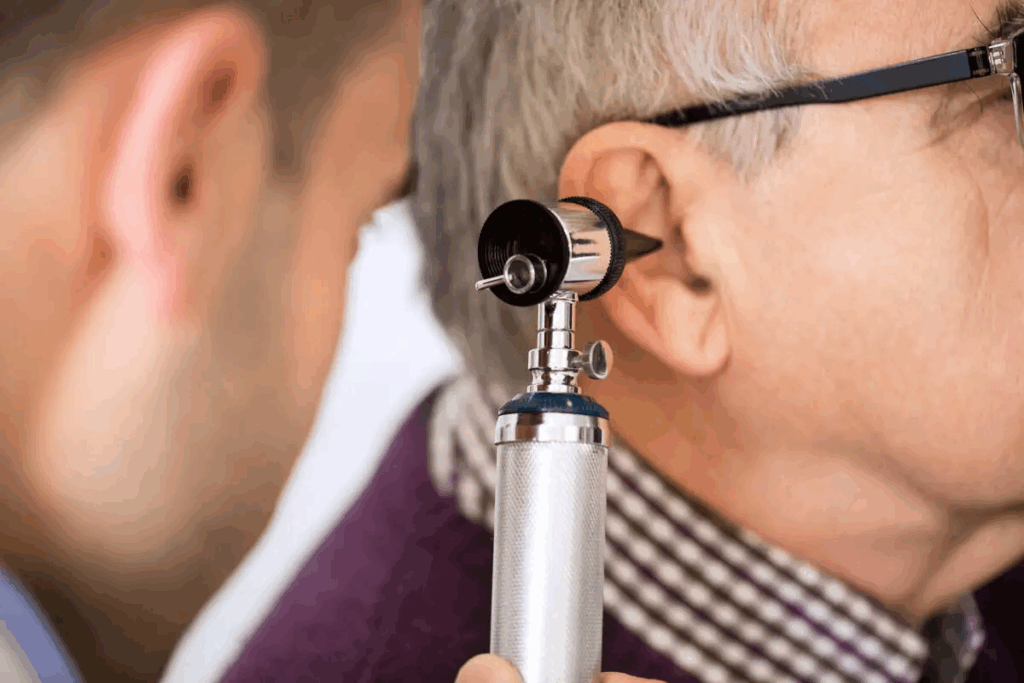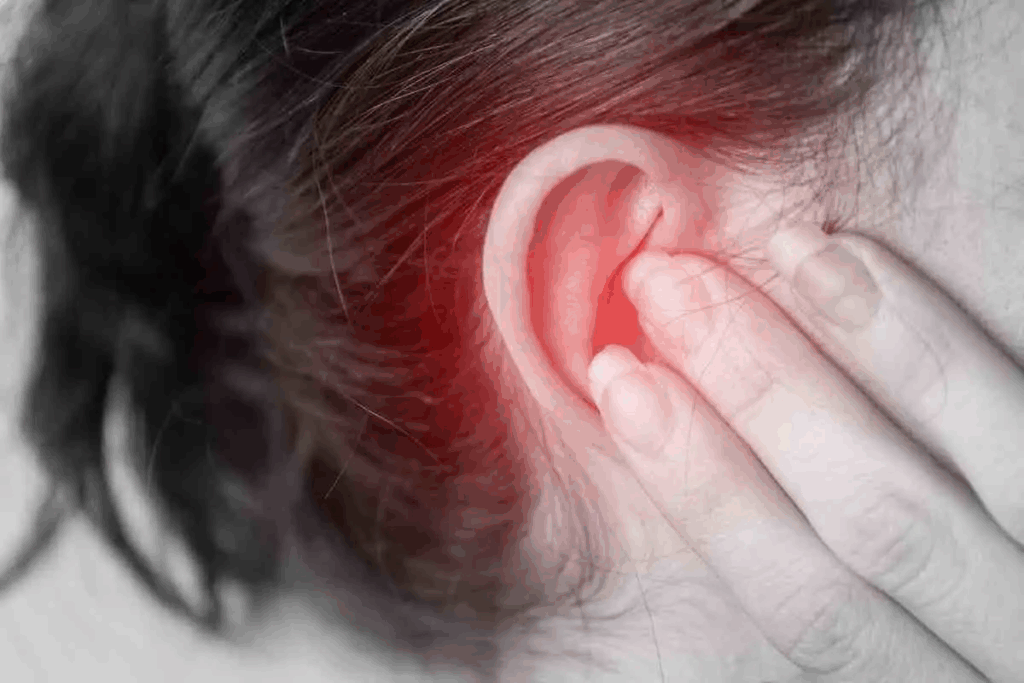
Do ear infections cause hearing loss? Yes, temporary conductive hearing loss is common, but permanent loss is rare. Millions of people worldwide face the challenge of losing their hearing. Yet, many don’t notice the warning signs until it’s too late.
If you often ask people to repeat themselves or have trouble hearing high-pitched sounds, you might be losing your hearing. The World Health Organization says nearly 2.5 billion people will have some hearing loss by 2050.
It’s important to know the first signs of hearing loss. This way, you can take action early. We’ll talk about why hearing health matters and what happens if you ignore it.
Key Takeaways
- Recognizing the warning signs of hearing loss is key to acting fast.
- Hearing loss is a big problem worldwide, affecting millions.
- Spotting it early can stop it from getting worse.
- Making small changes in your daily life can protect your hearing.
- There are professionals who can help if you’re losing your hearing.
Understanding Hearing Loss: Statistics and Overview

About 1 in 8 Americans have some hearing loss. This shows how big of a health issue it is. It’s key to know about hearing loss, its causes, and how it affects people and society.
Hearing loss isn’t just for the old. It can hit anyone, thanks to noise, infections, or aging. Looking into it, we see it’s a complex issue with many sides.
The Growing Prevalence of Hearing Loss in America
Hearing loss is getting worse in the U.S. Over 30 million Americans have it in one or both ears. This number will likely go up as more people get older.
“Hearing loss is a big public health problem. It affects not just the person but their family and community too. We need to raise awareness, teach people, and find the right medical help.”
Many things cause hearing loss to grow. More noise, older people, and health issues are some reasons. Knowing these helps us find ways to lessen its effects.
Age Group | Prevalence of Hearing Loss |
18-44 years | 6.2% |
45-64 years | 23.5% |
65-84 years | 53.7% |
85 years and older | 73.1% |
Types of Hearing Loss and Their Characteristics
Hearing loss comes in different types, based on the cause and ear part affected. The main kinds are sensorineural, conductive, and mixed.
Sensorineural Hearing Loss: This is the most common. It happens when the inner ear or auditory nerve gets damaged. It’s often permanent and can be from aging, noise, or health issues.
Conductive Hearing Loss: This happens when sound can’t get to the inner ear right. It’s from earwax, infections, or ear shape problems. Sometimes, it can be fixed with medicine or surgery.
Mixed Hearing Loss: This is when you have damage in both the outer or middle ear and the inner ear or auditory nerve.
Knowing the different types of hearing loss helps find the right treatment. Doctors can then give specific help to improve or keep hearing.
First Signs of Hearing Loss You Shouldn’t Ignore

Spotting the first signs of hearing loss is key to acting fast. Hearing loss is common and affects many people. Knowing the early signs is vital for early treatment.
Difficulty Hearing High-Pitched Sounds
Having trouble with high-pitched sounds is an early warning. This might mean you struggle to hear kids or women. High-frequency hearing loss often comes with age or loud noises.
Trouble Following Conversations in Noisy Environments
It’s hard to follow talks in loud places like restaurants. Background noise makes it tough to pick out sounds. This usually points to sensorineural hearing loss, affecting how the inner ear processes sound.
Frequently Asking People to Repeat Themselves
Often asking people to repeat what they said is a sign. It happens in quiet and loud places. It shows you’re having trouble with sound clarity.
Turning Up Volume on Devices Higher Than Normal
Always needing to turn up the volume on devices is another clue. This is a way your body tries to make up for hearing loss.
Knowing these signs lets you act early. If you notice any, see a doctor for help. They can check your hearing and guide you.
The Connection Between Deafness with Ear Infections
Hearing loss can happen because of ear infections. It’s important to know this to prevent and treat it well. Ear infections can block sound because of swelling and fluid in the middle ear.
How Ear Infections Cause Hearing Difficulties
Ear infections, or otitis media, happen when germs infect the middle ear. This causes swelling and fluid. This fluid can make the eardrum swell and block sound from getting to the inner ear.
The type and how bad the hearing loss is can change. It depends on the ear infection and the person’s health.
For example, the fluid in the middle ear can be so thick. It stops the ossicles from vibrating with sound waves. This means sound can’t get to the inner ear well, causing conductive hearing loss.
Temporary vs. Permanent Hearing Loss from Infections
Hearing loss from ear infections can be either short-term or permanent. It depends on the infection’s severity, treatment success, and any other health issues.
Often, hearing loss from ear infections goes away once the infection is treated. But, if ear infections keep coming back or are very bad, they can cause permanent damage.
Type of Hearing Loss | Causes | Outcomes |
Temporary Hearing Loss | Fluid buildup in the middle ear due to ear infections | Hearing returns to normal after treatment and resolution of the infection |
Permanent Hearing Loss | Repeated or severe ear infections, damage to the ossicles or eardrum | Permanent damage to hearing, potentially requiring hearing aids or other interventions |
It’s key to know how ear infections can harm hearing. This helps get medical help fast to avoid lasting damage. If you’re having trouble hearing or keep getting ear infections, see a doctor right away.
Age-Related Hearing Loss: Understanding Presbycusis
It’s important to know about presbycusis, as it affects many older people. Presbycusis, or age-related hearing loss, is common among those over 65. It gets worse after 75.
The Natural Hearing Degeneration Process
As we get older, our inner ear changes can cause hearing loss. The hair cells in the cochlea, key for hearing, start to wear out. This makes it hard to hear high sounds and understand speech, mainly in loud places.
Key aspects of the natural hearing degeneration process include:
- Deterioration of hair cells in the cochlea
- Reduced ability to hear high-frequency sounds
- Difficulty understanding speech in noisy environments
Risk Factors That Accelerate Age-Related Hearing Loss
While age-related hearing loss is common, some factors can make it worse. These include:
- Exposure to loud noises over a lifetime
- Certain medical conditions, such as diabetes and hypertension
- Genetic predisposition
- Smoking and other lifestyle factors
Health experts say managing these risk factors can slow down hearing loss. “Early detection and treatment of hearing loss can greatly improve life quality for those with presbycusis,” notes a leading audiologist.
“Hearing loss is not just a natural part of aging; it’s often a sign of underlying health issues that need to be addressed.”
Audiologist
Understanding how hearing loss happens and what speeds it up helps us protect our hearing. By taking action, we can keep our hearing sharp and enjoy life more fully.
Other Common Causes of Hearing Loss
There are many reasons for hearing loss, not just getting older. Knowing these can help prevent and treat hearing problems.
Noise-Induced Hearing Damage
Noise-induced hearing loss (NIHL) is a big problem in today’s world. Loud sounds can harm the inner ear’s hair cells, causing permanent damage. Common sources of noise include industrial machinery, music concerts, and firearms. The National Institute on Deafness and Other Communication Disorders (NIDCD) says, “Wearing earplugs or earmuffs can prevent NIHL.”
“Noise-induced hearing loss can be prevented by avoiding exposure to loud sounds or by wearing protective devices such as earplugs or earmuffs.”
NIDCD
Medical Conditions That Affect Hearing
Some medical conditions can also cause hearing loss. For example, otosclerosis is a condition where bones in the middle ear grow abnormally. It can lead to hearing loss. Meniere’s disease, affecting the inner ear, can cause vertigo, tinnitus, and hearing loss too.
- Otosclerosis
- Meniere’s disease
- Autoimmune inner ear disease
Medications That Can Damage Hearing
Some medicines, called ototoxic drugs, can harm the inner ear and cause hearing loss. These include certain antibiotics, chemotherapy drugs, and malaria treatments. The risk depends on the drug, how much is taken, and the person’s sensitivity.
Genetic Factors in Hearing Loss
Genetics also play a big role in hearing loss. Some people are more likely to have it because of their genes. It can be present at birth or develop later. Scientists are studying genetics to find out more about hearing loss.
It’s important to know about these causes of hearing loss. This knowledge helps us prevent and treat hearing problems. By being aware of the risks, we can protect our hearing better.
When to Seek Medical Help for Hearing Concerns
Knowing the signs of hearing loss is key for early treatment. We’ll show you when to get medical help and how to pick the right doctor.
Warning Signs That Require Immediate Attention
Some symptoms need quick medical check-ups. These include sudden hearing loss, severe ear pain, or discharge. If you see these signs, get help right away.
The table below lists urgent signs for medical care:
Warning Sign | Description |
Sudden Hearing Loss | A sudden drop in hearing, often in days or hours. |
Severe Ear Pain | Long-lasting or severe ear pain. |
Ear Discharge | Unusual fluid or discharge from the ear. |
Choosing the Right Healthcare Professional
Finding the right doctor for hearing issues is important. Start with your primary care doctor. They can check your health and send you to a specialist if needed.
Specialists to Consider:
- An otolaryngologist (ENT specialist) for ear problems.
- An audiologist for hearing tests and advice on hearing aids.
Being aware of warning signs and choosing the right doctor helps you tackle hearing issues well.
Diagnosing and Treating Different Types of Hearing Loss
Getting a diagnosis and treatment early is key to managing hearing loss. It improves life quality for those affected. Hearing loss can stem from many causes, and finding the right cause is vital for effective treatment.
Professional Hearing Tests and What They Reveal
Professional hearing tests are a critical step in diagnosing hearing loss. These tests show the type and extent of hearing loss. This guides the right treatment options.
Dr. Jane Smith, an audiologist at the American Speech-Language-Hearing Association, says, “Comprehensive hearing tests help us understand the nature of a patient’s hearing loss. This enables us to recommend the most effective treatment.”
Audiologists use tests like pure-tone audiometry, speech audiometry, and tympanometry. These tests assess hearing thresholds and identify issues. The results help determine the best treatment plan.
Hearing Test | Purpose | What It Measures |
Pure-tone Audiometry | Assess hearing thresholds | Minimum sound intensity a person can perceive |
Speech Audiometry | Evaluate speech understanding | Ability to hear and understand speech |
Tympanometry | Examine middle ear function | Movement of the eardrum and reflexes of the middle ear muscles |
Medical Interventions for Infection-Related Hearing Loss
Medical interventions can be very effective for infection-related hearing loss. Antibiotics or antiviral medications may be prescribed. Sometimes, surgery is needed to repair middle ear damage.
“Prompt treatment of ear infections can prevent long-term hearing damage,” says Dr. John Doe, an otolaryngologist at the Ear Institute. “It’s vital to seek medical attention if symptoms persist or worsen.”
Hearing Aids and Assistive Listening Devices
Hearing aids are a common solution for managing hearing loss. They amplify sound, making communication easier. Assistive listening devices, like personal amplifiers and loop systems, can also help in specific situations.
Modern hearing aids are advanced and can be customized to fit individual needs. They come in various styles, including behind-the-ear, in-the-ear, and completely-in-canal models.
Surgical Options and Advanced Treatments
In some cases, surgical options are considered for treating hearing loss. Cochlear implants, for example, can be effective for severe to profound sensorineural hearing loss. Other advanced treatments include bone-anchored hearing aids and middle ear implants.
These treatments offer new hope for individuals with significant hearing loss. They provide improved communication and a better quality of life.
The Psychological and Social Impact of Hearing Deficiency
Hearing loss is more than a physical issue. It deeply affects our mental health and how we connect with others. This condition touches many parts of our lives, showing us how important it is to address it.
How Hearing Loss Affects Mental Health
Hearing loss and mental health are closely linked. It can cause stress, anxiety, and depression. This is because it makes communication hard, leading to feelings of isolation.
The effort to hear better can be very tiring. This can make us feel fatigued and irritable. It also makes it hard to join in social activities, making us feel lonely.
Strategies for Maintaining Social Connections
There are ways to keep social connections strong despite hearing loss. Good communication is essential. This can be helped by using hearing aids and other devices, and by practicing clear speech and lip-reading.
- Talking openly about hearing loss can help reduce stigma and improve understanding among loved ones.
- Using technology like captioning on TVs and phones can make talking easier and more fun.
- Joining support groups, online or in-person, can connect us with others facing similar issues.
By using these strategies and staying proactive, we can lessen the impact of hearing loss. This leads to a more fulfilling and connected life.
Conclusion: Taking Proactive Steps for Your Hearing Health
It’s key to know when you might be losing your hearing. Understanding why hearing loss happens helps us protect our ears. This way, we can enjoy life more fully.
Spotting early signs, like trouble hearing high sounds or following talks in loud places, is important. It lets us act fast. We can keep our hearing good by getting medical help when needed and living a healthy lifestyle.
Knowing if you’re losing your hearing and acting early is critical. This helps us stay connected with the world and keep our social bonds strong.
Looking after your hearing is a big part of staying healthy. We urge you to make your hearing health a priority. If you’re worried about your hearing, don’t hesitate to get professional advice.
FAQ
What are the common signs that indicate I’m losing my hearing?
Signs include trouble hearing high-pitched sounds and following conversations in noisy places. You might also ask people to repeat themselves a lot. Turning up the volume on devices more than usual is another sign.
Can ear infections cause permanent hearing loss?
Yes, ear infections can lead to temporary or permanent hearing loss. It’s important to see a doctor if symptoms don’t go away.
What is presbycusis, and how does it affect older adults?
Presbycusis is hearing loss that comes with age. It makes it harder to talk and join in social activities. It’s a natural part of aging.
What are the other common causes of hearing loss beside age-related hearing loss?
Other causes include damage from loud noises, medical conditions, some medicines, and genetics.
When should I seek medical help for hearing concerns?
Get medical help right away for sudden hearing loss, severe ear pain, or other urgent signs.
How is hearing loss diagnosed, and what are the treatment options?
Doctors use tests to find hearing loss. Treatments include medicine for infections, hearing aids, and surgery.
How does hearing loss affect mental health and social connections?
Hearing loss can make you feel stressed and anxious. It also makes socializing harder, affecting relationships.
Is hearing loss permanent, or can it be treated?
Hearing loss can be permanent or treatable, depending on the cause. Some need medicine, while others need devices or surgery.
What are the warning signs that I’m going deaf?
Warning signs include trouble with high-pitched sounds and understanding speech. You might also feel tinnitus or ear pain.
Can I prevent hearing loss, and if so, how?
You can’t avoid all causes of hearing loss, but you can protect your hearing. Avoid loud noises, wear ear protection, and manage health issues.
References
National Institute on Deafness and Other Communication Disorders. (n.d.). Tonsillectomy and Adenoidectomy. Retrieved from https://www.ncbi.nlm.nih.gov/books/NBK536942/






